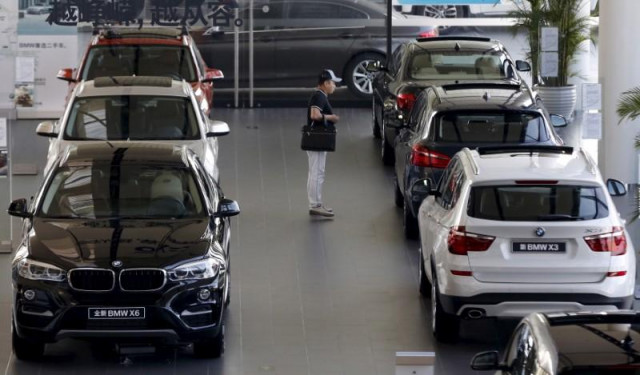Auto industry’s job creation potential
Pakistan’s auto policy has seen too many ups and downs

PHOTO: REUTERS
Pakistan’s auto industry firms, especially the local assemblers, have an enormous potential for expansion and job creation. Pakistan’s auto policy has seen too many ups and downs. Currently, there are three tiers of customs duties on auto assemblers. The three established assemblers — Indus, Honda and Suzuki — are in the highest duty bracket, and Greenfield/Brownfield projects pay less than half.
It is time to rationalise import duty structure and provide an opportunity to new and old assemblers to expand and create a great deal to create more jobs throughout the country. The current import duty structure for passenger vehicles for established assemblers is 31% and for Greenfield/Brownfield 11%. There should be an across-the-board, one duty level of (say) 15% for all new and old auto assemblers. This duty structure should be fixed for at least 10 years and no change should be made in it during that period. This will give an enormous boost to auto production as the existing assemblers will be on a level-playing field with newcomers and will be encouraged to expand production. Also, future newcomers will have confidence in a standardised duty structure and will be able to plan long-term production as there will be a level-playing field for all.
This is likely to increase auto production from the present level of 260,000 to well over 500,000 a year, creating another one to two million jobs in the country in transportation, component manufacturing, sales and service, repairs, auto assembly, etc. Experience has shown that whenever duty is lowered, the production increases and the government collects more revenue due to increase in production volume.
Another major advantage of an increase in volume in the auto industry is that it will attract newcomers to component manufacturing. Currently, only a small portion of components are manufactured in Pakistan and the assemblers are forced to import components that should be produced in Pakistan, but with higher production, it will be much more viable for new entrants and existing players to invest in auto component manufacturing. This will benefit the auto industry and the consumer as it will help bring prices down as the current duty structure on import of parts is 46% for existing assemblers and 26% for Greenfield/Brownfield assemblers. Manufacture of higher number of components and elimination of duty on those will have a direct impact on vehicle sales prices.
The import of second-hand cars has damaged Pakistan’s auto assembly business and it should be prohibited completely as these create no new jobs in assembly and increase the burden on our foreign exchange resources. Also, why create a market in Pakistan for Japan and Thailand’s second-hand vehicles at the cost of our own auto industry. A lower, across-the-board import duty of 15% will substantially reduce vehicle sales prices in Pakistan and make local vehicles more affordable for all including those who currently buy second hand imported vehicles.
The auto industry in Pakistan is still at a nascent stage and requires some hand-holding from the government not by way of subsidies but through a consistent policy that remains unchanged for several years. Lower labour costs and a consistent auto policy can make Pakistan a regional hub of auto manufacturing for Japanese, Korean, European and other vehicles and make Pakistan a springboard for export of vehicles to Central Asia, the Middle East, and other regional markets. Thailand has accomplished this a long time ago. Pakistan is now ready to become another major auto-export hub, generating millions of new jobs.
Published in The Express Tribune, May 1st, 2019.
Like Opinion & Editorial on Facebook, follow @ETOpEd on Twitter to receive all updates on all our daily pieces.
















COMMENTS
Comments are moderated and generally will be posted if they are on-topic and not abusive.
For more information, please see our Comments FAQ